Jacob DeNeui's Blog, page 4
July 8, 2015
Destined To Fail

I remember as a child when I first started falling in love with my favorite sport, soccer. There's something about the thrill of dribbling the ball down the grassy field, allowing the energy of the ball to travel through my foot and into my soul. It was invigorating and electrifying for my little five year old spirit. The only thing that pleased me more than playing soccer was winning. Unfortunately I spent much more time with the former than the latter. I remember spending hours outside in the backyard, just me and my dad, playing one on one. And getting scored. Over and over and over again. Granted I was five and my dad probably could have let me win a couple of times to make me stop crying so much (Dad, if you're reading this, my counselor told me I've made great progress in overcoming the emotional trauma from this time in my life). It was plain to see from early on that winning was very important to me, and failure was not acceptable. At least not without the shedding of many tears.
Well, I'm about twenty years older now and I've managed to grow a little bit along the way (and while I'm certainly no Mezzi, I've managed to slightly improve my game in soccer as well). Life has taught me a lot of valuable lessons. I've learned a lot about organization, how to live a disciplined life, and what it takes to accomplish your dreams. If you know me well you know that I am a fairly driven kind of guy. Many people have goals in life and work hard to achieve them. This is so much a part of me that sometimes I feel that my greatest goal in life is actually to accomplish goals. I guess there's just something mildly intoxicating about that feeling you get when you score a winning goal, when you ace that test you studied so hard for, or when you finish that painting that leaves everyone's eyes wide in fascination. I'm sure we all know what I'm talking about. It's that high you get when it seems everything in life is going your way. No need to change sides, the grass is quite green right where you are. These moments of triumph and jubilation that you experience are not to be taken lightly as they are vital to providing encouragement and a sense of focus and purpose in life. With this being said, I believe we must be wary when we begin to notice an overabundance of success in our life. Allow me to explain. I have trained in martial arts for more than fifteen years. I've gone from a weak, bony little boy who knew nothing about defending himself to a third degree black belt who can hold his own in a fight. This success did not come overnight, and there were certainly moments along the growth curve where I experienced greater gains than any other times. One of those explosions of growth came for me after a tournament I competed in where I received a royal whooping in my sparring division, particularly from a competitor who seemed to sneak past my defenses as easily as if I opened the door and invited him in for tea. It was mildly humiliating for me, not to mention extremely aggravating. I had never fought someone so fast and bold before, and my miserable loss left me feeling inadequate and weak. But I will tell you I've never experienced such a rapid growth in ability as I did after that great defeat. The comfort buble I had built around myself by continually fighting the same people who only mildly challenged me came to serve as nothing but a cage in which I was trapped, unable to achieve greater potential, unable to discover who I could truly become.
At the end of the day it all comes down to one thing: pride. Jesus once said that in order to be the greatest you must become the least. To intentionally put ourselves beneath someone else is anything short of natural yet it is our only option if we desire to achieve our greatest potential. In speaking to the creative person, actor and director Harold Ramis give some of the best advice I've heard. Ramis suggests to "find the most talented person in the room, and if it's not you, go stand next to him. Hang out with him. Try to be helpful." I've found myself in this situation many a time and I can guarantee you that Harold's advice is not as easy as it sounds. There's something that keeps me from wanting to admit my inadequacies to others, and merely admitting that I'm not the most creative person in the room can be a bit hard to swallow. Yet speaking from experience, I can say that the times I've grown the most in my design work have been when I have placed myself in the role of pupil and someone else that of teacher, even when the latter was a fellow classmate like myself. Most times I have to force myself to swallow an extra large portion of humble pie. Whenever I accept my role as student, it often means I have already failed at some endeavor and am publicly declaring my inadequacy. Yet just as with my learning experience in the realm of fighting, I cannot deny the enormous benefit of admitting my failures and then humbling myself in order to learn from others. And just as my learning remained stagnate while I found myself in a continual place of winning and success, so you can find yourself in a place where you might actually be "the most talented person in the room". If this is the situation, I refer you to the wisdom of author/artist Austin Kleon: "If you ever find you're the most talented person in the room, you need to find another room". The more time you spend in your stagnating pool of success, the more your rob yourself of golden opportunity to learn and grow from others who may have ideas, tips or wisdom you never would have produced otherwise. If pride comes before a fall, then humility comes before success, one way or another.
I still may not be the most talented and creative architect out there, which is why I strive to surround myself with people who inspire me and push my way of thinking. I certainly know I'm not the best fighter out there, which is why I don't mind losing to the best fighters at a tournament so long as I come away having gained some wisdom or insight. In fact I can't think of a single activity or pursuit where I can confidently claim to be the best in the world, but maybe that's not such a bad thing. Perhaps by accepting not just the necessity of failure but also it's inherent growth opportunities, we may eventually fully embrace this invaluable learning tool. Perhaps if we are all destined for greatness (which I believe we are), we are simultaneously destined to fail.
June 1, 2015
When Design Matters
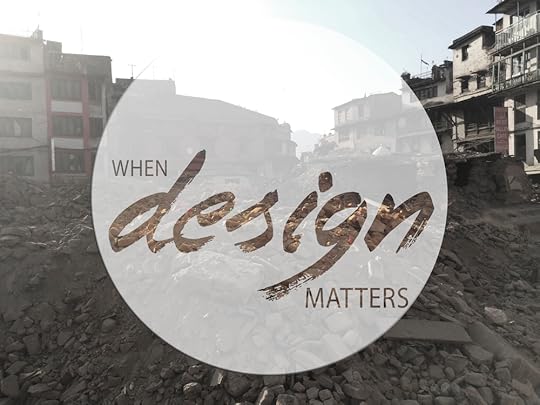
(Quick Precursor:) In my last blog, I told you all that I was going to take the next couple of entries to describe some of the life lessons I have gathered from activities I am passionate about, excluding architecture. However, sometimes thoughts and ideas produced by passion come to surface that do not necessarily conform to preexisting frameworks, and it is exactly these thoughts and ideas that the world needs to be introduced to, for it is the things that set your heart on fire that will change the world. The topic of this blog is one of those things.
Nearly a month ago, Nepal experienced a devastating earthquake that left 8,500 dead and millions with shelter. Hundreds of aftershocks have only served to prolong the cold, silent terror that lurks over the people of central and Eastern Nepal like a thick, suffocating blanket. The people live in constant fear of what another seismic episode could bring, which one of their loved ones it could rip from their arms. As the image below shows, both the rural and urban landscape are filled with endless scenes of devastation, of brick and concrete rubble encasing the broken dreams and hearts of countless Nepalese. It is one thing to see such devastation on the news inside one's safe and comfortable home, but that is not where I find myself today. My trip to Nepal two years ago left me with more than just memories of pre-disaster Nepal, but it also left me with deep friendships with people who are suffering and in need. While I praise God that their lives were not taken, their homes and their livelihoods have been erased in a largely preventable disaster. That's right, I said preventable.
While we seldom have control over the forces in life that are thrown at us, we do have a sizable amount of influence over how we prepare for and handle those incidents. Such is this the case with the terrible destruction inflicted upon the building infrastructure in Nepal. While I was in Nepal, and for several months before and afterwards, I completed a research project on entrepreneurship in non-profit architecture, utilizing the seismically unstable buildings in Nepal as a hypothetical opportunity for creative design work for people in need. In my research I learned a lot about the reason behind the unnecessarily large destruction wrought by these earthquakes, primarily due to a lack of available strong building materials, but also a lack of governmental enforcement of human safety and welfare in new construction. The combination of these creates a recipe for chaos and danger, and it's a problem that's ripe for a solution.
A team from my local church just returned yesterday from spending two weeks helping to alleviate some of the greatest need in the country in the Kathmandu area. They took with them hundreds of pounds of tarps, water filters, toys, and other emergency supplies for the Nepali people and distributed them to some of the outlying villages in the Kathmandu valley. The actions they and many other organizations across the world have taken to meet this great need are so necessary and cannot be ignored. And yet as I have continued to be more exposed to the vast amounts of needs in the world and the innumerous means and methods of filling those needs, I have only seen a greater call for innovation and ingenuity in how we approach our methods of attack. I recently attended the American Institute of Architects (AIA) Convention in Atlanta, where I was privileged to hear and see the work that architects are engaging in across the country to tackle issues such as poverty in Africa and disasters in our own country. The panel discussion leaders showed the work that their firms have engaged in, ranging from intelligent, disaster-conscious hospitals to deployable disaster relief shelters that simultaneously act as low income housing in New York City. The broad range of proposals and understanding of the issues at hand show a fertile ground for creative responses to the needs. Questions are being raised, ideas are being proposed, but the best thing is that there are people who are taking action all over, and they're doing it in both conventional and unconventional ways. Conventional ways such as Venture Church's emergency provisions and rebuilding efforts and Architecture for Humanity's disaster relief shelters, and unconventional ways such as Julia King's architectural contribution to India's sanitation problem (Lessons from Potty Girl) and 100 Fold Studio's vision for long term architectural input (The New Face of Architecture). If you're interested in impacting the world in conventional ways, consider your hand shook. I can assure you we will never reach a point where we run out of needs for this type of humanitarian aid. And if your passions lie in another direction, I hope my words may spur you on to greater things, to new levels of meaning and purpose for the gift of creativity and design that has been placed deep inside you. I don't believe any passion is ever given without the possibility (and I would add "responsibility") of it's ultimate fulfillment. Do you have a passion for any of the needs you see around you? Whether it be the other side of the world or the other side of the street, the opportunities for employing our creative potential to radically change the world are infinite, and you, my friend, may be just the person to initiate that change. In his Ted Talk titled "How to Build Better Blocks", speaker Jason Roberts describes his own, seemingly futile attempts to bring about change for his dead, car-controlled Austin community, and the incredible success he experienced. In his discussion, Roberts stated, "If you're passionate about something, you're probably going to be a leader." To some, those words might utterly terrify you. To others, they mean the self-imposed road blocks you've placed before yourself no longer hold any practical meaning.
Before I end, let me share with you some of my own personal experience with following my passion for utilizing my skill sets to bring about the kind of change in the world that I consider of utmost importance. In less than a month I will be traveling to the country of El Salvador to aid in the construction of a new building for an orphanage called La Casa de mi Padre. My story with La Casa began years ago when I worked on a promotional design for the orphanage with 100 Fold Studio, and has just recently culminated in an opportunity to actually go and employ some of my construction skills for a cause I truly believe in. Now you may be asking yourself how working on an orphanage relates to a discussion on creativity's role in meeting needs across the world. I admit, missional construction projects are fairly conventional, but I will tell you that I consider this only one of many steps in fulfilling my desire to utilize design in missions work. I fully plan on experiencing things, seeing things, and learning things while in El Salvador that will influence my vision and my perspective on the future. For me it is a development opportunity, just as working at CTA has been and continues to be an opportunity to develop myself into the type of creative individual who looks around at the world and sees what can be. Call it visionary exercise, a continual practice of formulating and stepping out in new ideas and ventures while also looking for where the most strategic place to focus my energy and resources would be. Management guru Peter Drucker once advised to, "look for things that are ready to happen." So as I continue to develop myself professionally while simultaneously seeking opportunities to serve along the way, I strive to keep my eyes and my ears open to what the zeitgeist of the world around me is communicating, what it is the world needs and how my particular skill sets can play a role in fulfilling that need. Design matters, and its up to you, my friend, to "design" your path. Design is needed in how Nepal rebuilds it's cities. Design is needed to create spaces and communities that nourish life. Design is a necessity, and your creative ability enables you to play a role in fulfilling that need. So don't miss out on these incredible opportunities that lie at your fingertips. As author Andy Stanley wrote in his stellar book Visioneering, "Everyone ends up somewhere in life. Some people end up somewhere on purpose. Those are the ones with vision.”
PS: For anyone interested in reading more about my research in entrepreneurship and Nepalese building solutions, I would love to give you a free pdf of my book!
May 9, 2015
What Karate Has Taught Me
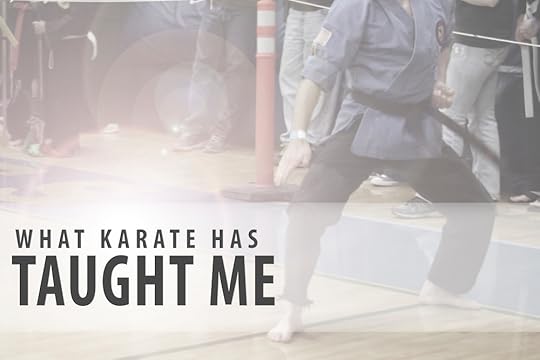
A couple of weekends ago, I spent 11 hours in a hot, sweaty, packed gym with hundreds of kids and adults running around, doing something that I absolutely love: karate. I've been a martial arts fanatic ever since I was nine years old and have never looked back. Over the past 15 years I've experienced an incredible journey of self-discovery, hard work, and pure joy. Its amazing how one activity can have such a monumental impact on almost every part of your life. Recently I've found myself playing the introspection card and, not surprisingly, karate was dealt in a few hands. As I have examined my life, I can see how my experiences and training in karate have taught me so many things about who I am and who I want to be. So, I decided that for my next few blogs I would focus on a few areas of my life besides architecture that have helped mold and shape me into who I am today.
To begin with, karate has taught me the art of timing. Notice I intentionally refrained from saying the word "patience" because I believe that patience is only half the picture (the half that I personally prefer to overlook). While the art of waiting is extremely important, especially in today's society of expedited service and split second gratification. However, I have come to find that the beauty is found in the balance of waiting and acting, tension and release. When performing "kata" or forms, we like to call this highs and lows. One applies highs and lows in their forms to exude speed and power when necessary, but one will surely lose the power of their form if they do not create deliberate pauses, gaps you might say, in order to highlight the dynamism of the other moves. Another application of this idea is the utter importance of the rests, or quiet parts, in music. Sometimes it is the void rather than the substance that truly makes the masterpiece. I've come to discover that this truth is universal and applies in so many aspects of my life. If I cannot learn when to be bold in my speech and when to bite my tongue, I will surely damage or destroy my relationships. Passion in my profession can quickly become a massive flurry of overwhelming deadlines and expectations if I cannot learn to take time to stop, and simply be. In this sense the art of balance is truly about more than standing blindfolded on one leg like a circus act.
Karate has also taught me the beauty of humility. I'll never forget the words my instructor's instructor Grandmaster Royce Young spoke when we had the privilege of training with him many years ago. When discussing all of his years in the martial arts and all of the things that he has learned, he summed it up by saying, "The more I learn, the more I learn I don't know". In my opinion, this is the reflection of someone truly great. Humility seems to be the best kept (unintentionally so) secret of today. Our gods of music and sports today speak of glory and their greatness, as if their duly noted high level of ability in their field or art is what makes them great. While these self-proclaimed kings and queens may win oscars and super bowls, the truly great leaders are the ones who demand not praise and adoration but rather humbly offer the gifts they have so graciously been given. Some of the greatest experts on leadership, including but not limited to Jesus of Nazareth, John Maxwell and Stephen Covey share a common theme in many of their writings: the servant leader. I look back in thankfullness as I see how my instructors saw my vanity and pride early on and helped me to overcome that weakness while simultaneously training me in my physical and mental capabilities. It was a gift I will never forget and hope to pass on to my own students and those around me.
Finally, karate has taught me the necessity of sacrifice. The summer before my freshman year of high school I found myself at a crossroads where I had to make a decision, karate or soccer. It was only a few short months before my black belt test and I knew I would need to fully commit to achieve this goal of mine. On the other hand, I had played soccer since I was five and, while not the most skilled player, was an avid lover of the sport. As you can probably assume, I chose to give up high school soccer in order to give the proper time, attention and drive to the sport that had won my heart. It is said that if you try to catch two rabbits, you catch no rabbits. Attention divided is no attention at all, and I knew that I could either half-heartedly pursue both passions (and probably end up more exhausted) or I could sacrifice one for the other. This is a painful lesson for many who's passion for life, profession and everything in between makes it hard to say no to anything, but it is a necessary choice if one desires to truly maximize the effectiveness of their gifts and passions. In his book The Five Levels of Leadership, John Maxwell makes the point that the most influential and iconic leaders are so focused and selective that they typically limit their choice of activities to 1-3 things, but they do them extremely well. This requires great sacrifice, an essential part of all martial arts. Ironically, this lesson given to me by karate has majorly influenced my decision to invest less time in the martial arts now as I pursue my dreams and goals in my career of architecture (don't worry though, I still get my kick on).
I find it truly amazing the way that aspects of my life that I once might have considered independent are in reality synergistic in nature and have worked together to form me into who I am today. Karate has shaped so much of my life and it continues to do so. Years ago my mother made me a scrapbook filled with pictures and memories of my experiences in the martial arts and in the back she included this note: "I don't know if you've grown into who you are because of nine years of martial arts or if you are a 2nd dan black belt because of who you are beneath that. Somehow I think they both are true." (That basically sums up how wise my mom is right there). So what are the character builders of your life? I encourage you, if you haven't already, to truly examine the parts of your life that have molded you and seek to understand the ways they have affected you. If you find something interesting I would love to hear your own story! Life is too incredible not to be fully and completely explored, navigated, and experienced.
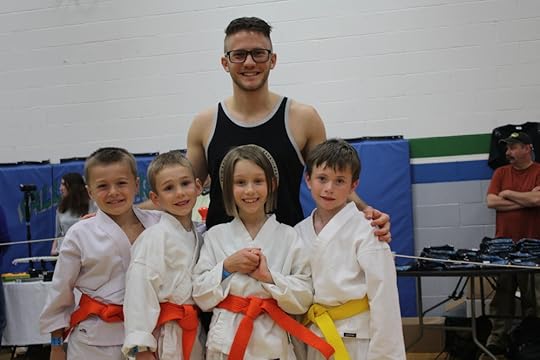
Me with my little ninjas before our tournament
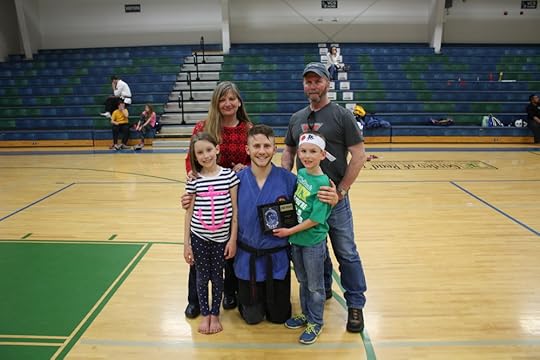
Three generations of martial artists right here: (Left to Right) My student Adelyn, instructor Janie Green, Me, student Wyatt, and instructor Jeff Green.
April 5, 2015
Easy as 1,2,3
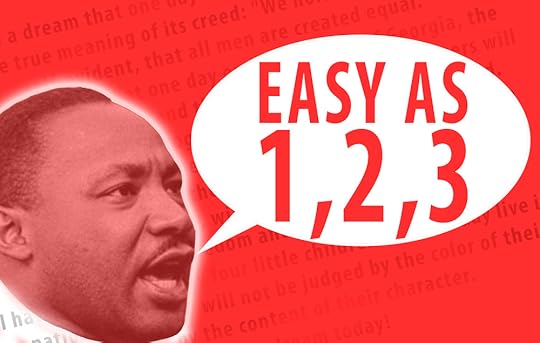
If I were to ask you what motivated you in life, what would you say? Is it something you've given much thought to or perhaps you've never taken the time to analyze what motivated you and why? What if I were to ask you what motivated you in your career field? Do you know why you are pursuing the work that you are? Perhaps it is a field that you happened to fall into and it just seemed to work for the time being? I believe too many of us in the world today suffer from what I see as a lack of intentional living. We have vague dreams that make us excited when we think of them, but they sadly retain their dreamland citizenship, never moving to the real world where the rubber hits the road. And while our hopes and expectations lie in unreachable euphoria, we find ourselves trapped in a reality that we never intended, never planned, never wanted. No matter how much effort is poured into our work, no matter how much we muscle through the mire of tasks that leaves us unfulfilled, we still feel something is lacking.
So why is this? What's the difference between Jack the contractor who lacks joy or fulfillment in his work, and Joe the garbage man who simply loves the purpose he holds in society? As author Any Stanley put so beautifully, "Everyone ends up somewhere in life. Some people end up somewhere on purpose." I know that, at the end of my life, I personally don't want to look back at the trail I chose, wishing I had ended up at a different destination. I believe that to live intentionally you must start with introspection. Instrospection is simply the act of examining one's own thoughts and feelings. The ancient Greeks championed the motto "Know Thyself", and it's imperative place in creating a life of discovery and fulfillment is just as relevant to us as it was to them.
I was recently forced to better understand myself as I struggled with choices in where to pursue my passions in the profession of architecture. As I was still pursuing my college degree, the options were fairly limitless. I knew that certain ideas and projects made me feel good and excited, but I didn't understand why or how to channel that information through a useful conduit that would guide me in my own decision-making process. But over the course of time that I intentionally spent in architectural internships, being mentored, reading, and general observation, I slowly began nailing down what it was that made me excited in life and what I needed to pursue if I was to achieve fulfillment in my career. I finally came to a point where I could name three primary motivators in my professional life. Allow me to expound:
MISSION: At the heart of all of my professional aspirations is a desire to accomplish change that make the world better according to my values and how I view the world. My heart is to utilize design and creativity to promote and edify what I believe to hold the greatest value to society and our world as a whole such as education, community connection, missions work, and empowering the impoverished, just to name a few.
QUALITY: Settling in life is easy, and its something I never want to do. I want every work that I pour my creative energy into to be a direct embodiment of the best I have to offer this world. I believe that quality is not merely found in the highest budget project, the most technologically advanced structure, or even the building with the most glass, steel and concrete (not that there's anything wrong with these materials, I might add). Rather I consider quality work to be that which is expressive of emotion, meaning and beauty that transcends what is found in our ordinary environment through the implementation of timeless principles, a holistic approach to the work, and a creative efficiency that maximizes all available resources to their fullest capacity.
ADVENTURE: After my mere 24 laps around the sun, I've come to realize that I have an insatiable desire for adventure. I can't resist trying new foods, I get bored with my hairstyle if I keep it longer than six months, and I find almost nothing more enjoyable that traveling and exploring the world. I'm no adrenaline junkie, but my need for new and exciting things to do is simply a part of who I am, and is something that I know I must incorporate into my career if I am to truly be fulfilled with what I do.
Pursuing intentional living can look like a lot of different things to different people. I can only attest to the tools and strategies that work for me as I have pursued my own dreams and visions in life and how I hope to create something tangible from the intangible. If you would allow me to take my previous personification example one step further, I would encourage everyone to pursue a metaphorical dual citizenship for their dreams, for a vision cut off from its ethereal homeland is as fruitless as one caged in a metaphysical fairy tale. Provide yourself the framework you need to give existential life to your aspirations, as I did with my three professional motivators, while never losing sight of the passion that gave birth to them in the first place. While many will try to convince you that only a week-long session with a certified life coach will help you figure out how to live out your dreams, I refer back to Socrates when I say to simply "Know Thyself". For me, the framework I developed to discover my dream was three simple words. Who knows, maybe for you it might also be as easy as 1,2,3.



